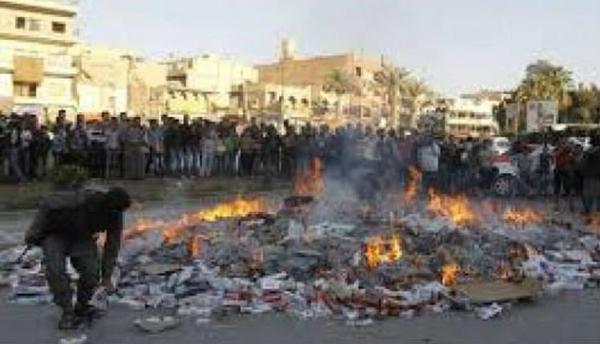
ISIS burns books from Al Mosul Library in Iraq. This photograph has been widely shared on social media. Original source unknown.
In an act described as “cultural cleansing,” ISIS fighters unleashed their anger on thought, culture and history, burning thousands of rare manuscripts, documents and books, when they ransacked the Mosul Library, in Iraq.
First estimates put the number of books burned at around 8,000. Fresh reports, however, says as many as 112,709 manuscripts and books, “some of which were registered on a UNESCO rarities list” have been lost, reports the Independent, quoting a library official.
Other reports say some of the manuscripts destroyed date back 800 years, adding that other libraries faced a similar faith in areas held by the terror group, which has also been staging public book burnings.
According to the report, the militants, who have come to control large swathes of Iraq and Syria, then demolished the building housing the library, using explosive devices. Mosul, Iraq's second largest city fell into the militants’ hands in June 2014 and is now under the control of the group, a splinter of the notorious Al Qaeda, which is also fighting in Syria.
The Fiscal Times adds:
Among its lost collections were manuscripts from the eighteenth century, Syriac books printed in Iraq's first printing house in the nineteenth century, books from the Ottoman era, Iraqi newspapers from the early twentieth century and some old antiques like an astrolabe and sand glass used by ancient Arabs. The library had hosted the personal libraries of more than 100 notable families from Mosul over the last century.
While reports on the attack on the Mosul Library have just made the headlines, the United Nations Educational, Scientific and Cultural Organization (UNESCO) says attacks on libraries, museums and universities have been going on for several months. On February 3, it voiced “its alarm over the reported destruction of thousands of books in museums, libraries and universities across Mosul.”
UNESCO Director-General, Irina Bokova described the destruction as “a new phase in the cultural cleansing perpetrated in regions controlled by armed extremists in Iraq.”
She further adds:
It adds to the systematic destruction of heritage and the persecution of minorities that seeks to wipe out the cultural diversity that is the soul of the Iraqi people.
According to the UN agency:
The books – on topics ranging from philosophy and law to science and poetry – have been “deliberately burned” over the past several weeks in what may be “one of the most devastating acts of destruction of library collections in human history.”
This takes us back to 1258, when invading Mongols attacked and ransacked Baghdad, then the centre of the Abbasid Caliphate. In that year, Beit Al Hekma (House of Wisdom), a learning centre and library, was destroyed, with the Mongols throwing valuable books into the River Tigris, reportedly turning the river's water black from the ink.
In recent times, the Mosul library, opened in 1921, was also looted during the US invasion of Iraq, as SubMedina, a blogger based in Morocco, reminds us:
isis destroys mosul library and thousands of books in iraq. this is like the us invasion all over again. pic.twitter.com/q7BuBfmKQt
— Don't Talk To Me (@SubMedina) February 24, 2015
Many netizens expressed shock.
Palestinian Ismail Abuelkass is lost for words:
داعش حرقت مكتبة الموصل التاريخية. “@cnnturkcom: IŞİD , Musul'da kütüphane yaktı >>> http://t.co/DjMhjmTc3B pic.twitter.com/jaPG0MjuKb“
— Ismail Abuelkass (@ilkass) February 25, 2015
ISIS burned down the historic Mosul library
Jameel, from Riyadh, Saudi Arabia, adds:
داعش لعنها الله تكرر جريمة التتار وتحرق ثروة علمية هائلة في مكتبة الموصل.. من أزهق روح الإنسان لن يترفع عن إزهاق فكره.
— جميل (@jameel___) February 24, 2015
The ISIS, may they be damned, have repeated the Mongol's crime and burned down a huge scientific legacy at Mosul Library. Those who kill people will not think twice before killing ideas
And Far cry continues:
#داعش تفجر مكتبة الموصل بعد حرق كتبها ومخطوطاتها النادرة أي إيمان هش يخشى على نفسه من الكتب pic.twitter.com/3AEh5ckCWC
— Far cry (@Farcry99) February 24, 2015
The ISIS bombs Mosul Library after burning down its books and rare manuscripts. What kind of fragile belief is afraid of books?







20 comments